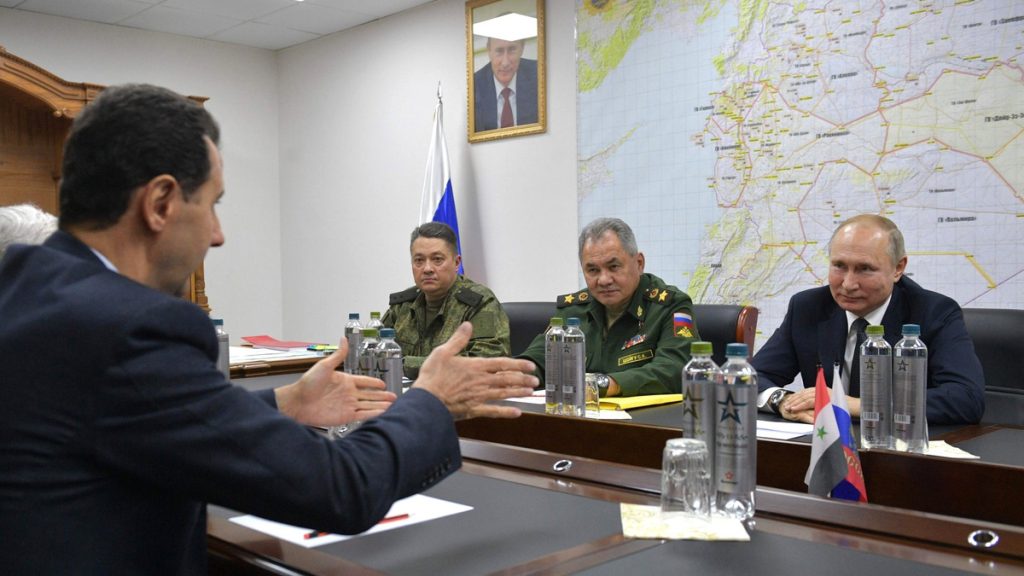Following the Chinese-brokered normalization of relations between Saudi Arabia and Iran, the Middle East seems to be entering a new political era. Russia is reportedly attempting to follow Beijing’s diplomatic approach and help Syria and Turkey bury the hatchet.
The two countries enjoyed a strong cooperation until the civil war broke in Syria out in 2011. Turkey soon entered the conflict by backing the rebels fighting against Syrian President Bashar al-Assad, a move that had a significant impact on relations between Damascus and Ankara. Turkey even launched several military incursions into Syrian territory, aiming to neutralize the presence of Kurdish-dominated forces that Ankara sees as “terrorists”. Moreover, to this day Turkish military – be it directly or through certain anti-Assad groups – control parts of northern Syria.
The United States, on the other hand, has occupied parts of the Middle Eastern country and established a military base near Syria’s border with Jordan. In addition, US troops are also stationed in northeastern Syria, while Damascus frequently accuses them of illegal exploitation of Syrian oil. Thus, the end of US military presence in the war-torn nation is possibly one of Russia’s, Iran’s, and the Syrian government’s major geopolitical goals.
But for now, the three countries will likely attempt to achieve some more moderate goals. The defense ministers and intelligence chiefs of Russia, Syria, Iran, as well as NATO member Turkey, have met in Moscow on April 25 to hold talks on the future of the Arab nation. In May, the four countries’ foreign ministers might hold a meeting in Moscow, as part of efforts to rebuild Turkey-Syria ties. Turkish President Recep Tayyip Erdogan has recently expressed interest in organizing a peace-building summit, and his efforts have been endorsed by Russian President Vladimir Putin.
“Our aim is to solve the problems through negotiations and bring peace and tranquillity to the region as soon as possible”, said Turkish Defense Minister Hulusi Akar prior to the Moscow summit.
The talks came as Syria and Turkey have taken steps towards a rapprochement. In December 2022, Turkish and Syrian defense and security officials have held their first public meeting in more than a decade. It was a clear indication that Damascus and Ankara seek to improve relations after years of animosity during Syria’s civil war. The problem, however, remains Turkish military presence in northern Syria. Damascus demands the full withdrawal of Turkish troops for ties to be restored. It is, however, very unlikely that Ankara will withdraw its forces from the neighboring country at least until after the Turkish election scheduled for May 14. But from the Syrian, Russian and Iranian perspective, the very fact that the four nation’ security officials have discussed the withdrawal of Turkish troops from the Arab country, represents a step in the right direction.
Russia is Syria’s main ally, and it has been encouraging Damascus’ reconciliation with Ankara for years. But even if Moscow manages to eventually achieve the same success China has recently achieved, and help Syria and Turkey normalize relations, there is no guarantee that the conflict in Syria will come to an end in the near future. Presently, the Middle Eastern nation is facing low-scale positional warfare in the north, but the bigger problem for Russia and Iran is that the United States is unlikely to leave the Arab nation anytime soon. As a result, pro-Iranian militias will undoubtedly continue fighting the American forces on the ground, which will have an impact on various attempts to bring stability to Syria.
However, if Russia, Iran and Turkey find a way to bring peace at least to Syria’s restive northern regions, that will be a significant step in the years-long process of stabilization of the Syrian Arab Republic. The very fact that Ankara changed its approach, and has agreed to hold talks with the Syrian officials – even though in the past it saw them as “illegitimate” – indicates that Syria could finally enter a less turbulent period. More importantly, several Arab countries have already reestablished diplomatic ties with Damascus, which is what Russia and Iran interpret as a victory over the American attempts to isolate Bashar al-Assad.
Ankara, for its part, will likely have to find a way to de facto give up its support for the Syrian rebels, but at the same time not to openly abandon them. In other words, in order to normalize relations with the Syrian government, Turkey is expected to delicately balance its ambitions to restore political and diplomatic ties with Assad, with its strategy of acting as a major backer of the Syrian opposition forces.
In other words, the ball is in the Turkish court now. Syria, Russia and Iran will wait for Ankara to continue taking constructive approach that could lead to the end the of the Syrian conflict. However, it remains to be seen if the outcome of the Turkish general elections will have an impact on Ankara’s policy regarding Syria.
